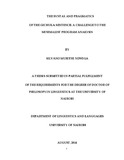| dc.description.abstract | This study is an analysis of the syntax and pragmatics of Gichuka
sentences within the framework of the Minimalist Program, as proposed by
Chomsky (1995a), and the Relevance theory as proposed by Sperber and Wilson
(1986).
The study was motivated by two main gaps: a) not much research has
been done on the syntax and pragmatics of Gichuka sentence in general and the
mapping of the morpho-syntactic units such as pronominals, lexical NPs and
quantified expressions to the truth conditional meaning of sentences in
particular; and b) though a number of studies have been done on the morphosyntax
of verbs and NPs of languages related to Gichuka, the majority of them
focused on the syntactic structure without linking it to meaning. This is precisely
what the present study set out to do.
This this study found out that the logical form level of representation, as
suggested within the Minimalist Program, was inadequately specified to
provide an account of the truth conditional meaning of sentences in Gichuka
and that it could not independently provide an adequate account of the formmeaning
correlations for Gichuka sentences.
To address these inadequacies, the study proposes a modification in
Chomsky’s (1995) computational system by motivating a syntax―pragmatics
approach to account for the derivation of truth conditional meaning for
sentences, which involves the process of saturation after spell-out, and the
process of enrichment in the lexicon | en_US |

